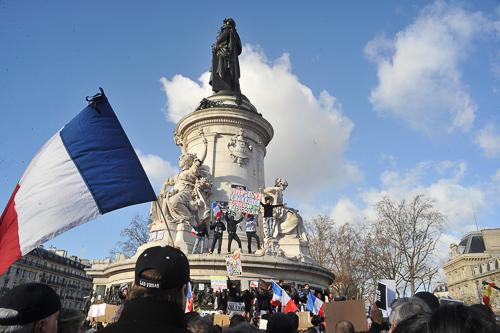
Silvio Waisbord is a professor of media and public affairs.
Two weeks ago, the world was riveted by the massacre of 11 journalists from the French satirical magazine, Charlie Hebdo. Since the shooting, the magazine has published its latest issue featuring depictions of the Prophet Mohammed, sparking protests all over the world.
This global debate reminds us of the complexity of the idea of freedom of the press. It is not as straightforward as one might think when listening to recent rhapsodic defenses.
It’s actually quite a messy concept. I don’t know of any society where there is unanimity about what a free press means, what it is for and whether it should be subjected to any limitations – or on what grounds.
When absolutists call for the undivided defense of a free press, they forget that there are social regulations aplenty. There are always “ifs” and “buts” to a free press, although they are not typically called “censorship” in the traditional sense.
Societies agree to regulate specific content – from obscenity to hate speech to national security-related information – through legislation. Journalistic codes of ethics offer guidelines about what to publish. Editorial judgments inevitably curb the outflow of news based on myriad considerations – timing, taste, decency, style, credibility. Citizens support and punish different forms of content by reading or paying for some and not others. Advertisers influence news production by supporting news delivered to specific, desirable audiences. Social media companies patrol user-generated content.
We may love the idea of a free press in the abstract, especially if threatened by governments and violent groups, but the reality is more complicated. Societies neither agree on what regulations are pernicious, nor whether democratic curbs on news are oxymoronic.
When observers concerned about offensive speech call on the press or individual publications to be civil and mindful of specific sentiments, it’s not obvious where the line is – or should be – drawn.
Should journalism as a whole equally respect endless sensitivities in today’s global information environment? How do we determine when respect for concerns and beliefs restricts the publication of anything provocative? Is it legitimate to mock powerful individuals and organizations – as well as their beliefs – but not people who are socially excluded? Shouldn’t journalism, like art or critical thinking, push various publics outside comfort zones? Is it realistic to think that journalism as a whole can be bound to common ethical principles at a time when digital news and information overflow the traditional boundaries of the press?
Calibrating freedom of the press and social responsibility is a tough balancing act. Because the question is often asked incorrectly, it leads to binary positions – absolutists and relativists. Certainly, duplicity and hypocrisy from opportunists, like some politicians, who inconsistently defend free speech and tolerance does not help either.
Just as democratic societies should strengthen spaces for public expression, journalism should consider the purpose of specific content – whether society benefits from certain news and opinions, and whether democratic goals are advanced.
Some of us want to preserve freedom of the press while promoting tolerance and understanding in a world divided by bigotry, intolerance and conflict. This isn’t a new challenge, but it is exceedingly more difficult in a globalized world.
How do we protect and support freedoms while pursuing the public good? We don’t want anyone to tell the press – nor even pseudo-anarchist, offensive publications that constantly probe the boundaries of taste, humor, respect and decency – what to publish. Yet it is not obvious how freedom of the press, one of the most treasured democratic ideals, can be reconciled with other equally critical principles for public life such as diversity and tolerance.
Perhaps we should have extreme democratic convictions but hold them moderately.





